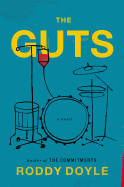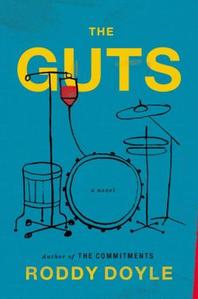

Jimmy has also been diagnosed with bowel cancer; the treatments leave him with memory lapses while his business flounders. In an effort to exploit the upcoming Eucharistic Congress, last held in 1932, he tries to track down original 1930s-era music, but when he fails to find it, he presses his eldest son into a dubious scheme to substitute his own.
As is Doyle's trademark, the characters in The Guts are laconic, their conversations matter-of-fact. Their speech is informal, mostly half-sentences and incomplete thoughts, marked by dashes instead of quotation marks to draw the reader into the conversation, bringing us fully into Jimmy's life as it unfolds. A few pages of terse but pitch-perfect dialogue can carry complete subplots full of devastating emotional currents no less powerful for being unspoken. Doyle pushes this technique further by incorporating text messages--and these characters text constantly, with brief messages that seem similarly mundane but reveal everything about their lives.
Jimmy may make his living by plying nostalgia, and The Guts rests on the notion of time's passing and what endures, but it is not a nostalgic novel. It avoids the emotional pitfalls of its premise and becomes a celebration of the quotidian guts of life--its difficulties and hard, arbitrary tragedies, but also its joys. Doyle's characters are flawed but human and sympathetic. Only Aoife seems slightly unrealized: she is almost too perfect. Still, this novel is a triumph, and the last section in particular, with everyone at the climactic music festival, is as exuberant and celebratory as we all want life to be. --Jeanette Zwart
Shelf Talker: Doyle's often funny, bittersweet and unsentimental follow-up to The Commitments re-introduces Jimmy Rabbitte, now facing his mortality yet still finding joy in the music and people he loves.

